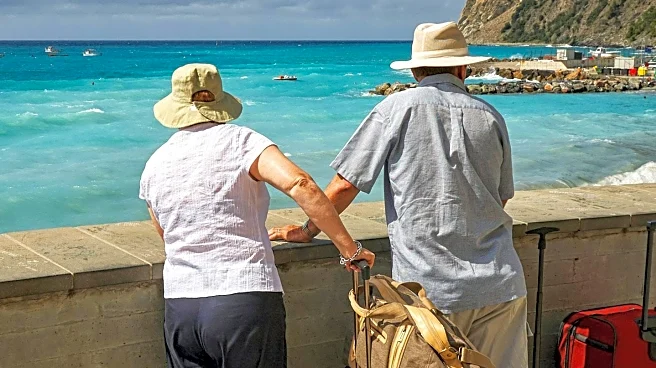What's Happening?
Kelly Benthall and her husband, who retired early, have been practicing slow travel for a year, staying in one place for a month to fully experience their surroundings. However, a recent five-week trip through the UK and Ireland, with seven stops in quick succession, left them exhausted and reaffirmed their preference for a slower, more intentional lifestyle. The couple found the fast-paced travel stressful, reminiscent of their pre-retirement lives, and it led to physical and mental fatigue. They realized that while fast travel allowed them to see many sights, it did not provide the deeper connection and sense of belonging that slow travel offers.
Why It's Important?
The Benthalls' experience highlights a growing trend among retirees and travelers who seek meaningful experiences over rapid sightseeing. This shift towards slow travel can impact the tourism industry, encouraging longer stays and deeper cultural engagement, which can benefit local economies. It also reflects a broader societal movement towards mindfulness and intentional living, as people increasingly value quality over quantity in their experiences. This approach can lead to more sustainable tourism practices, reducing the environmental impact of frequent travel and fostering a more respectful interaction with local communities.
What's Next?
The Benthalls plan to continue their slow travel lifestyle, staying in one location for extended periods to immerse themselves in the local culture. This decision may inspire other travelers to adopt similar practices, potentially influencing travel industry trends. As more people embrace slow travel, there could be increased demand for accommodations that cater to long-term stays and experiences that offer cultural immersion. The tourism industry may need to adapt by providing more personalized and sustainable travel options to meet this growing interest.
Beyond the Headlines
The Benthalls' story underscores the importance of balancing exploration with rest and reflection, a concept that can be applied beyond travel to various aspects of life. It raises questions about how modern lifestyles, often characterized by speed and efficiency, can lead to burnout and a loss of connection with one's surroundings. Embracing a slower pace can enhance well-being and foster a deeper appreciation for life's moments, encouraging individuals to prioritize experiences that align with their values and desires.









